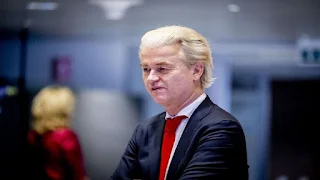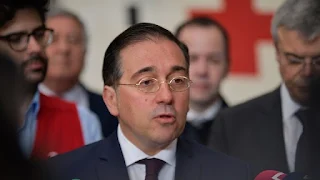Far-right Dutch MP Geert Wilders made a key concession on Monday to potential coalition partners, announcing that he was withdrawing legislation he proposed in 2018 calling for a ban on mosques and the Quran.
An anti-Islam Dutch lawmaker withdraws a proposal he submitted in 2018 to ban mosques and the Qur’anHe opposed helping Ukraine and promised to tone down his rhetoric against Muslims and the Qur’an. Geert Wilders wins the Dutch elections.
This step came a day before the resumption of talks to form the next government after the November elections, and abandoning the draft law may be decisive in gaining the confidence and support of three other major parties that Wilders wants to include in a coalition with his Party for Freedom.
One of the leaders of those parties, Peter Omtsigt of the reformist New Social Contract party, expressed concerns that some of Wilders' policies would violate the Dutch constitution, which enshrines freedoms, including freedom of religion.
During a parliamentary debate last year after the Freedom Party won 37 seats in the 150-seat Dutch lower house of parliament in the November 22 general election, Wilders signaled a softening of his party's strict anti-Islam stance.
“Sometimes I will have to withdraw proposals, and I will do that,” Wilders said in the debate. “I will show the Netherlands, and the legislature that we will adapt our rules to the constitution and bring our proposals in line with it.”
In November 2023, the far-right anti-Islam party, led by Geert Wilders, won the Dutch legislative elections.
Wilders is an outspoken Eurosceptic, having long fought to regain control of his country's borders, limit immigration, cut payments to the bloc's budget, and veto any further EU enlargement. He also called on the Dutch government to stop supplying weapons to Ukraine.
He called for the "removal of Islam" from the Netherlands, but during the election campaign he sought to improve his image by modifying some of his positions. He emphasized in particular that there are more pressing problems than reducing the number of asylum seekers, and toned down some of his anti-Islamic positions.
Spanish Foreign Minister Jose Manuel Albarez confirmed on Monday that his country now recognizes Kosovo's passports, but is still committed to not recognizing its independence.
He also stressed that Spain would "nothing be an obstacle to dialogue" between Pristina and the European Union.
An exemption system allowing holders of Kosovo passports to enter the Schengen area without visas came into effect on January 1, leading to Madrid's de facto recognition of the Kosovo passport.
Albarez told reporters, “Spain applies this procedure (visa exemption) as it is a member of the Schengen area,” adding, “Spain’s position has not changed. Spain still does not recognize the sovereignty or independence of Kosovo because we do not recognize the unilateral declaration of independence.”
While his country adhered to its position, the minister stressed that “Spain will never be an obstacle to the dialogue between Belgrade and Pristina” and “between Pristina and the European Union,” explaining that his country “supports” Brussels’ efforts “to strengthen this dialogue.”
Spain, Greece, Romania, Slovakia and Cyprus refuse to recognize Kosovo's independence from Serbia declared in 2008.



It is highlighting political pragmatism ahead of Dutch governance negotiations.
ReplyDelete